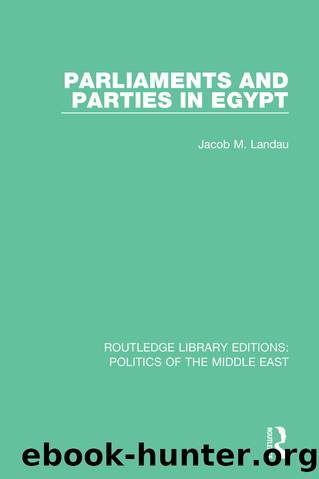Parliaments and Parties in Egypt by Jacob M. Landau

Author:Jacob M. Landau [Landau, Jacob M.]
Language: eng
Format: epub
Tags: Social Science, Regional Studies
ISBN: 9781317409625
Google: -uwsCgAAQBAJ
Publisher: Routledge
Published: 2015-07-16T05:03:28+00:00
It was not by mere chance that, during the first years of his political life, Mustafâ Kâmil concentrated on journalism. It must be remembered that journalism was the only practical politlcal battleground in Egypt at the end of the nineteenth century. while at the end of Khedive Ismâ'îl's rule there was in Cairo only one Arabic newspaper, twenty years later, in 1898, there were 50 Arabic dailies284 and in the whole of Egypt nearly 200 Journals and newspapers 285. During five years, from 1895-1900, about 500 newspapers and periodicals were founded in Egypt, most of which were very short-lived indeed286.
The increase in the number of newspapers went hand in hand with an increase in the number of their readers, as education progressed in Egypt. A newspaper afforded a connecting link between its readers. Thus, while in Europe groups and parties created their organs, in Egypt groups crystallized around already existing newspapers, and after a certain time grew into parties, the main interests and activity of which still continued to be centred in their organ. This had been the case, to a lesser extent, during the late 70's and early 80's of the nineteenth century and the same was still true regarding the development of almost every political party in Egypt up to the first World War 287.
Mustafâ Kâmil was aware of the great importance of having a newspaper of his own for propagating his views and ideas and for strengthening his ties with those elements whom, eventually, he hoped to shape into a political party. "Al-liwâ'" â "The Standard" â was the significant name given by Kâmil to his Arabic daily, which appeared for the first time in Cairo on January 2, 1900. It was founded as a reaction to the disappointment felt by Kâmil and others in the attitude of "Al-mu'ayyad" 288.
In the first issue, which ran to four pages, Kâmil sketched the programme and policy of his paper in general terms: "Al liwâ' " was to serve the Umma and Islam in honourable and practical ways; to strengthen the relations among Egyptians as well as among Muslims; to demand improvements in the education, economy and industry of the country.
Some of the best literary talent of Egypt at the time contributed to "Al-liwâ", notably Ahmad Shauqî and Khalîl Mutrân. But the character of "Al-liwâ' " was decidedly political and not literary. During the first seven years of the twentieth century it not only propagated patriotic ideas with great eloquence, but also gathered around it practically all extremist national elements, for the most part anti-British. "Al-liwâ' " employed just the same methods as Al-hizb al-watanî: bitter attacks on the Occupation, and insistence on the absolute necessity of independence for Egypt and the Sudan 289.
At the end of the year 1900, Kâmil was already publishing a supplement to Al-liwâ', called "Majallat al-liwâ'", which was sent free of charge twice every month to all the subscribers of the former 290. Moreover, the press of Al-liwâ' was occasionally used for the printing of books and pamphlets.
Download
This site does not store any files on its server. We only index and link to content provided by other sites. Please contact the content providers to delete copyright contents if any and email us, we'll remove relevant links or contents immediately.
| Africa | Americas |
| Arctic & Antarctica | Asia |
| Australia & Oceania | Europe |
| Middle East | Russia |
| United States | World |
| Ancient Civilizations | Military |
| Historical Study & Educational Resources |
Never by Ken Follett(2884)
The Man Who Died Twice by Richard Osman(2300)
Machine Learning at Scale with H2O by Gregory Keys | David Whiting(2293)
Fairy Tale by Stephen King(2073)
Will by Will Smith(2043)
Rationality by Steven Pinker(1765)
The Dawn of Everything: A New History of Humanity by David Graeber & David Wengrow(1571)
The Dark Hours by Michael Connelly(1571)
Principles for Dealing With the Changing World Order: Why Nations Succeed and Fail by Ray Dalio(1378)
Friends, Lovers, and the Big Terrible Thing by Matthew Perry(1330)
A Short History of War by Jeremy Black(1300)
HBR's 10 Must Reads 2022 by Harvard Business Review(1256)
Go Tell the Bees That I Am Gone by Diana Gabaldon(1236)
Can't Hurt Me: Master Your Mind and Defy the Odds - Clean Edition by David Goggins(1228)
515945210 by Unknown(1209)
Fear No Evil by James Patterson(1110)
443319537 by Unknown(1074)
Works by Richard Wright(1020)
Going There by Katie Couric(993)
